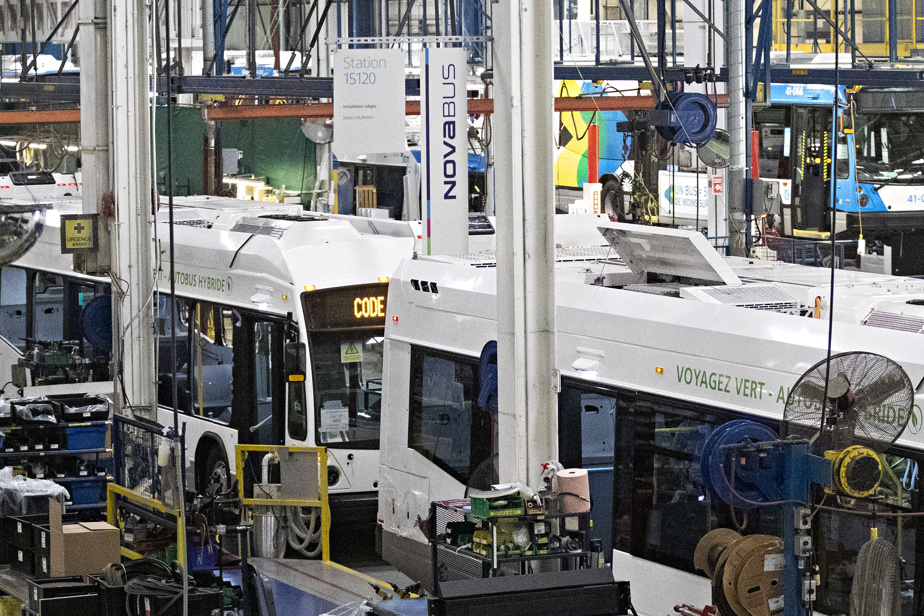A major contract won by Nova Bus in 2018 for hybrid models is giving the city bus manufacturer headaches. The company is trying to convince Quebec to agree to price increases by citing the surge in production costs since the start of the pandemic.
Some 850 hybrid urban buses were delivered to the 9 transport companies represented by the Association du transport supérieur du Québec (ATUQ) – including the Société de transport de Montréal (STM) – as part of this agreement covering a maximum of 1,525 units. At the time, this order, estimated at around 2 billion – if all options were exercised – was presented as “the largest” won by the company in North America.
“Manufacturers often include inflationary adjustments in contracts because in a few years, today’s prices will no longer be the same,” emphasizes Christos Kritsidimas, head of legal, public affairs and external communications at Nova Bus. What happened with the pandemic is that the projections all fell through. We have seen the prices of certain materials jump by 20%. »
According to our information, we are talking about around a hundred hybrid urban buses. The financial data of Nova Bus is not accessible since it is consolidated in that of the Volvo Group, its owner.
Since transport companies “never finance 100% the purchase of a bus”, Nova Bus is trying to raise awareness of the Legault government about its cause, underlines Mr. Kritsidimas. His name appears alongside five other representatives of the Volvo Group subsidiary – including president Ralph Acs – in its registration which has just been renewed in the Quebec register of lobbyists. We are targeting in particular the Ministry of the Economy and Innovation, that of the Environment and the Fight against Climate Change as well as Transport and Sustainable Mobility.
“Since we know that the Ministry of Transport finances 80% of transport companies, we published our [lobbying] mandate to be transparent,” says Mr. Kritsidimas. The discussions continue. We’ll see how they work out, but it’s not over yet. »
These steps do not concern the major 2.2 billion contract won last May for the delivery of up to 1,230 electric buses to nine transport companies – an order largely financed by Quebec (1.1 billion) and Ottawa (780 million).
Nova Bus, however, has its work cut out to convince the Legault government. Transport companies such as the Société de transport de Montréal, the Réseau de transport de Longueuil, the Société de transport de Laval and the Réseau de transport de la Capitale (Québec) contacted by La Presse directed questions to the ATUQ, which coordinated the consolidated call for tenders for hybrid urban buses. In a statement, the Association said it had closed the door to adjustments within the framework of “informal discussions” with the Quebec manufacturer.
“The ATUQ had informed Nova Bus of the impossibility of reviewing the price of awarded contracts, since this constitutes a major contractual modification,” she wrote. On the other hand, the contracts already provide for price adjustment clauses allowing price increases to be considered based on [inflation] and exchange rates. »
On Tuesday, it was not possible to know if there was any openness on the part of the Legault government. By email, the MTQ limited itself to responding that “in accordance with the lobbying mandate, Nova Bus made representations to the Ministry.”
Mr Kritsidimas says this is because the company is part of the Volvo Group – which has a market valuation of around 520 billion – and is able to support its subsidiary.
Nova Bus is not the only manufacturer to have seen the profitability of certain contracts eaten away by inflation and rising production costs. Headquartered in Winnipeg, NFI Group – a multinational of over 8,000 employees with factories in 9 countries – posted negative margins in 2022 in its manufacturing sector. They have picked up since the start of the year, but remain below 1%. NFI Group’s activities are more diversified than those of Nova Bus, since the Manitoba company also builds coaches.
Commenting on third quarter results last November, NFI Group management said it expected contracts with margins reduced by inflation to represent around 5% of its deliveries during the first six months of 2024.
